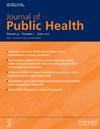Promotion of legume intake—Israeli dietitians’ knowledge, beliefs and practices
IF 3.6
4区 医学
Q1 PUBLIC, ENVIRONMENTAL & OCCUPATIONAL HEALTH
引用次数: 0
Abstract
Background The health and environmental benefits of legume consumption are reflected in dietary guidelines worldwide. However, legume intake fails to meet recommendations. Dietitians’ legume counseling practices can impact consumption patterns. This cross-sectional study assessed Israeli dietitians’ knowledge, attitudes, perceptions and practices regarding legume counseling and identified pertinent barriers and facilitators. Methods An electronic survey among Israeli dietitians (n = 309) was performed. Multivariable logistic regression assessed associations between recommending legumes with participants’ socio-demographic and professional characteristics, knowledge, perceptions, attitudes toward legume counseling and personal legume intake. Results Almost half (47.4%) of the participants recommended that 76% or more of their patients increase legume intake. Factors that were associated with recommending legumes were perceptions of fewer barriers to consumption [adjusted OR (aOR) 1.92 (95% CI 1.24–2.96)] and positive attitudes toward legume counseling pertaining to its importance [aOR 1.95 (95% CI 1.12–3.4)]. Negatively associated factors were a low level of personal legume consumption [aOR 0.38 (95% CI 0.15–0.94)] and working in hospitals [aOR 0.43 (95% CI 0.19–0.98)]. Conclusions Israeli dietitians’ recommendations for legume consumption were well below current guidelines. These findings indicate the need for a tailored intervention for nutrition professionals to increase the frequency of legume counseling and overall consumption.促进豆类摄入--以色列营养师的知识、信念和做法
背景 世界各国的膳食指南都体现了食用豆类对健康和环境的益处。然而,豆类的摄入量却未达到建议水平。营养师的豆类咨询实践会影响消费模式。这项横断面研究评估了以色列营养师在豆类咨询方面的知识、态度、看法和做法,并确定了相关的障碍和促进因素。方法 对以色列营养师(n = 309)进行了一次电子调查。多变量逻辑回归评估了推荐豆类与参与者的社会人口和职业特征、知识、认知、对豆类咨询的态度以及个人豆类摄入量之间的关联。结果 近一半(47.4%)的参与者建议其 76% 或以上的患者增加豆类摄入量。与推荐摄入豆类相关的因素是,他们认为摄入豆类的障碍较少[调整OR (aOR) 1.92 (95% CI 1.24-2.96)],并且对豆类咨询的重要性持积极态度[aOR 1.95 (95% CI 1.12-3.4)]。与之负相关的因素是个人豆类消费水平低[aOR 0.38 (95% CI 0.15-0.94)]和在医院工作[aOR 0.43 (95% CI 0.19-0.98)]。结论 以色列营养师对豆类摄入量的建议远低于现行指南。这些研究结果表明,有必要为营养专业人员提供量身定制的干预措施,以增加豆类食品咨询的频率和总体消费量。
本文章由计算机程序翻译,如有差异,请以英文原文为准。
求助全文
约1分钟内获得全文
求助全文
来源期刊

Journal of Public Health
医学-公共卫生、环境卫生与职业卫生
CiteScore
7.40
自引率
2.30%
发文量
120
审稿时长
6-12 weeks
期刊介绍:
Previous Title Zeitschrift für Gesundheitswissenschaften, Previous Print ISSN 0943-1853, Previous Online ISSN 1613-2238.
The Journal of Public Health: From Theory to Practice is an interdisciplinary publication for the discussion and debate of international public health issues, with a focus on European affairs. It describes the social and individual factors determining the basic conditions of public health, analyzing causal interrelations, and offering a scientifically sound rationale for personal, social and political measures of intervention. Coverage includes contributions from epidemiology, health economics, environmental health, management, social sciences, ethics, and law.
ISSN: 2198-1833 (Print) 1613-2238 (Online)
 求助内容:
求助内容: 应助结果提醒方式:
应助结果提醒方式:


